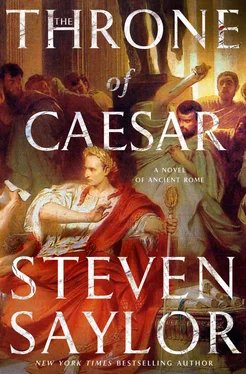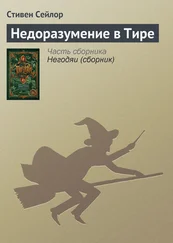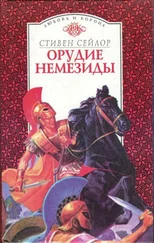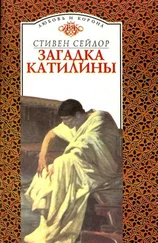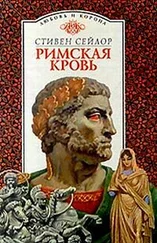Стивен Сейлор - The Throne of Caesar
Здесь есть возможность читать онлайн «Стивен Сейлор - The Throne of Caesar» весь текст электронной книги совершенно бесплатно (целиком полную версию без сокращений). В некоторых случаях можно слушать аудио, скачать через торрент в формате fb2 и присутствует краткое содержание. Год выпуска: 2018, Издательство: St. Martin's Press, Жанр: Исторический детектив, на английском языке. Описание произведения, (предисловие) а так же отзывы посетителей доступны на портале библиотеки ЛибКат.
- Название:The Throne of Caesar
- Автор:
- Издательство:St. Martin's Press
- Жанр:
- Год:2018
- ISBN:нет данных
- Рейтинг книги:5 / 5. Голосов: 1
-
Избранное:Добавить в избранное
- Отзывы:
-
Ваша оценка:
- 100
- 1
- 2
- 3
- 4
- 5
The Throne of Caesar: краткое содержание, описание и аннотация
Предлагаем к чтению аннотацию, описание, краткое содержание или предисловие (зависит от того, что написал сам автор книги «The Throne of Caesar»). Если вы не нашли необходимую информацию о книге — напишите в комментариях, мы постараемся отыскать её.
The Throne of Caesar — читать онлайн бесплатно полную книгу (весь текст) целиком
Ниже представлен текст книги, разбитый по страницам. Система сохранения места последней прочитанной страницы, позволяет с удобством читать онлайн бесплатно книгу «The Throne of Caesar», без необходимости каждый раз заново искать на чём Вы остановились. Поставьте закладку, и сможете в любой момент перейти на страницу, на которой закончили чтение.
Интервал:
Закладка:
It occurred to me that a toga would also make me a bit conspicuous when it came time to walk to home alone. It would mark me as a man of means, out without a bodyguard, and especially vulnerable were I to be a bit drunk, which was not unlikely. Ah, well, I would worry about that later. The nagging voice of reason in my head fell silent. There was something about setting foot in the Salacious Tavern that made a man put aside caution. Breathing in the stale wine fumes, I felt my cares fall away.
I was not the only man in the place formally dressed. Across the dimly lit room, seated in a corner by himself, was another man in a toga. I knew him. In fact, he had become, over the last few months, my regular drinking companion in this establishment, though usually at a later hour and not so formally dressed.
Gaius Helvius Cinna was in his midforties, strikingly handsome, and vain about his appearance. His curly black hair, just beginning to show some gray, was always clean and freshly cut and lightly dressed with expensive aromatic oils; as I crossed the room toward him I caught the scent of sandalwood. The same barber who cared so lovingly for his master’s hair also kept him perfectly clean shaven. Cinna had a strong chin, worth showing off. All his features were strong, including his broad nose and wide mouth and piercing gray eyes, but together they achieved a harmony that would please the eye of the most discriminating Greek sculptor. He could have posed for a statue of Mars.
He wore a plain white toga, suitable for a tribune, the office to which the Dictator had appointed him along with nine others. Cinna was only a few months into his year-long term, but he had already achieved considerable notoriety by taking legal action against two fellow tribunes. Those two had removed a diadem that someone had placed on one of Caesar’s statues, and they had also arrested a group of men who publicly hailed Caesar as king. Cinna charged the two tribunes with offending the dignity of the Dictator, and they had been driven out of Rome. Cinna had thus established himself very openly as a dedicated, even fanatical, partisan of the Dictator.
Cinna had a full cup of wine in his hand and raised it at my approach.
“Hail, Gordianus! If you are Gordianus. I hardly recognized you, dressed up in that toga. ”
“Yet I recognized you at once—handsome fellow that you are—though I could hardly believe my eyes. A tribune, with so many important duties, indulging in undiluted wine in the middle of the afternoon?”
“Hardly the middle. It’ll be sundown soon enough. Besides, I’m here not as a tribune but as a poet.”
“And what has drinking to do with poetry?”
“Everything! The nectar of Bacchus unleashes eloquence.”
“Does it? I know that being drunk can make a man think he’s eloquent.”
“Oh, Gordianus, you’re such a naysayer! That’s why I treasure you. I spend most of my time with sycophants of one stripe or another—a household of slaves who cater to my every whim, an adoring daughter, citizens begging for favors from a tribune, admirers who want to tell me how simply divine they find my Zmyrna. ”
“Your what? Is something stuck in your throat, Tribune?”
“There you go again, bringing me down to earth. You know perfectly well the name of my most famous poem, though I think you must be the only literate man in Rome who’s never read my Zmyrna. ”
“Alas, Cinna, I don’t know a single line of this poem, which you insist is more famous than the Iliad. ” This was true. I knew nothing about his Zmyrna, except that the poem was named for its Greek heroine. The myth it recounted was obscure, at least to me. Modern poets like Cinna made a great show of retrieving forgotten lore and spinning it into immortal Latin verse. This was certainly safer than lampooning living politicians, as Catullus had done, and more fashionable, at the moment, than celebrating scandalous ladies and their sparrows or tragic warriors and their wrath. “So why, as a poet, are you skulking in such a dark hole at this hour?”
“Skulking? Hardly. Any hour is a good hour to spend at the Salacious Tavern. And now I have someone to talk to. Clearly, the Fates have conspired to bring us together on this fine Martius afternoon.”
“The Fates have played all sorts of tricks on me today.”
“Have they? Well you must sit down, acquire a cup of this very fine Falernian at my expense—I insist—and tell me about your day.” He snapped his fingers at a buxom barmaid passing by and pointed at his empty cup and at me.
“Falernian? Do you have something to celebrate?”
“As a matter of fact, I do. The new poem is about to be born.”
“But that’s marvelous! Share a line with me.”
“ About to be born, I said. Not yet ready for the eyes and ears of the world at large.”
“Too bad. Well, then, you could always recite a bit of the Zmyrna for me, if you like. I wouldn’t stop you.”
“Never! Your utter ignorance of my poetry, however much it indicates a serious flaw in your character, is precisely what makes you the perfect drinking companion. I come here to escape my notoriety and to forget my muse for a while.”
“You just said wine inspires you, and that you’re here as a poet.”
“That part about inspiration was a lie. You had it right: Drunkenness only makes men think they’re clever. But I am here as a poet—a poet who drinks to forget the tremendous pressure being put upon him to share with the world his next great work.”
“But it’s finished, you said. Or nearly so.”
“No poem is ever truly finished. It is merely at some point published—trapped like a fly in amber, or slain like a tiger that’s skinned and made into a trophy. Publication kills the poem, in fact, but how else can it be made to lie perfectly still, and stop changing, so that others can examine it at their leisure? To read a published poem is like examining the corpse of a beautiful woman. She may still be beautiful, but how much more beautiful she must have been with flashing eyes and smiling lips, living and breathing and loving and ever-changing—like a poem while it’s still alive in the mind of its author, before it’s been made stiff and rigid on the pages of a scroll?”
“I could listen to you talk like that all night, Cinna.” This was true, even though—or precisely because—I could hardly understand a word of what he was saying. As coming to the tavern and conversing with an ignorant, uncultured, and undemanding fellow like myself was an escape for Cinna, so his erudite babbling, the more abstruse the better, was a wonderful escape for me, a man who had spent his life listening closely to every word he heard, constantly seeking hidden meanings, coded secrets, unspeakable truths.
“Perhaps, Cinna, this new poem will be so extraordinary it will make people forget your Zmyrna. Then you can have her back to yourself, so to speak.”
“That can never happen. It took almost ten years to make her—almost as long as the Trojan War, or the wanderings of Odysseus!—and since then another ten years have passed. At twenty, my beloved Zmyrna is too old for me now.” He laughed and shook his head. “No, my fear is that the new poem will not be thought as good as the Zmyrna, even though in every way it’s a greater work—longer, bolder, more complex, more elevated and elegant, expounding a far greater theme. You see, my new poem combines—for the first time ever, I think—two very different stories known to everyone—except perhaps to you, Gordianus—and shows that neither story can be fully understood without coupling it to the other.”
“Now you’ve completely lost me.”
Читать дальшеИнтервал:
Закладка:
Похожие книги на «The Throne of Caesar»
Представляем Вашему вниманию похожие книги на «The Throne of Caesar» списком для выбора. Мы отобрали схожую по названию и смыслу литературу в надежде предоставить читателям больше вариантов отыскать новые, интересные, ещё непрочитанные произведения.
Обсуждение, отзывы о книге «The Throne of Caesar» и просто собственные мнения читателей. Оставьте ваши комментарии, напишите, что Вы думаете о произведении, его смысле или главных героях. Укажите что конкретно понравилось, а что нет, и почему Вы так считаете.
